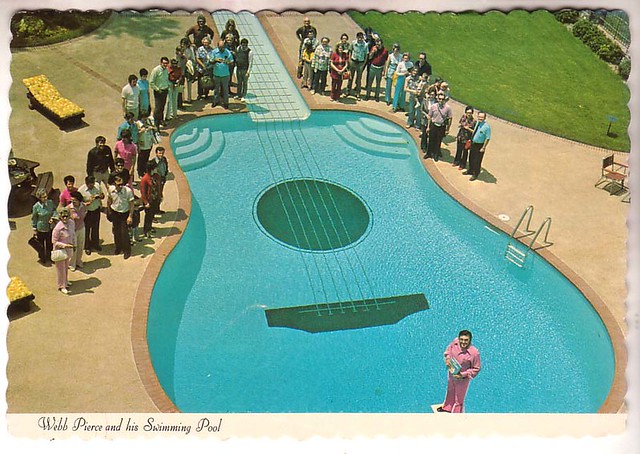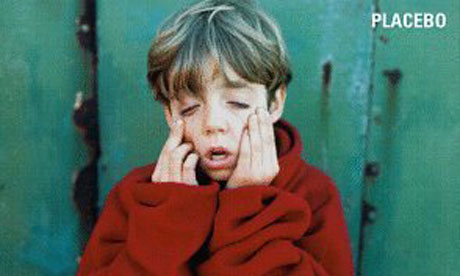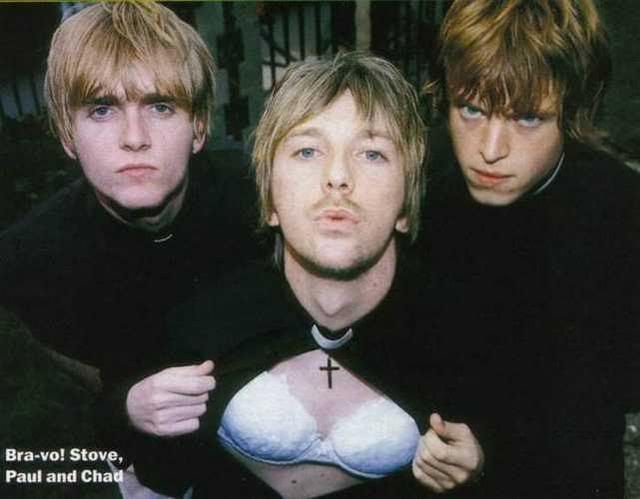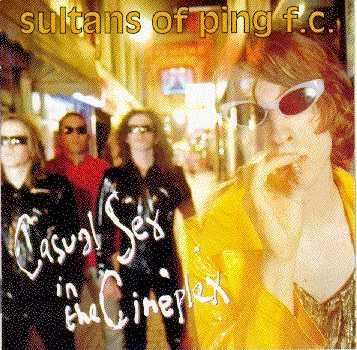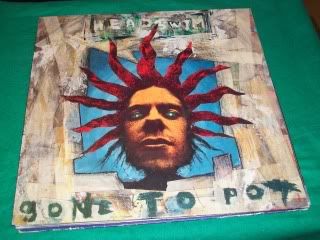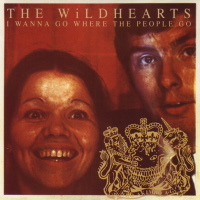More punk rock, and indeed more Smog UK, was to be had in June, when the STE held their second 2 Day Festival (at the Joiners, natch). I only made it to the Saturday, and missed the first few bands cos I was at work selling copies of OK Computer. This meant I missed openers Minute Manifesto - about whom you'll be hearing plenty more - and The Short & Curlies, who Jimmy (a new friend from work, about whom you'll be hearing even more than Minute Manifesto) informed me were hilarious. One of the bands I did catch was Grover, a melodic power trio from Manchester (not to be confused with the post-rock Grover, or a character from Sesame Street). They were followed by Ebola (not to be confused with the breakcore Ebola on Wrong Music - jeez, this band name lark's confusing, isn't it?). This Ebola ruddy well smashed it at the festival. With savage male/female dual vocals and a sound which blurred the lines between hardcore and power violence, they were one of the most intense bands I'd seen at this point. It was during their set that the venue's lights cut out, and they remained out of action for the headliners, Shutdown (not to be confused with the New York band of the same name. Obviously). In Ian Glasper's highly recommended tome Armed With Anger, the band claim that their last gig was at the LA2 with No Fun At All, Millencolin and Samiam, but I'm sure that at the time, this darkened performance was supposedly the last hurrah for the underrated post-hardcore crew.
Smog UK themselves split soon after the festival, but it seemed that a bunch of new bands were coming out of the woodwork in the local punk scene. Two of them, Good Grief and the afore-mentioned Minute Manifesto, played a free show at the Joiners in August. At this point, I knew the former bunch better as individuals, given that they included long-time scenesters Cov John (grin and bass), Rooster (spiky hair, football shirt and guitar) and Theresa (vocals). I don't remember a thing about their drummer, though ironically I met him years later in Brighton, where he's become a good friend. Good Grief played melodic punk, informed both by Cov John's beloved US pop punk and a more Blondie-ish feel (probably due to Theresa's vox). They were good, though it felt very much like watching some locals from the boozer having a bash at being a band.
And then there was Minute Manifesto.
At one point, I was tempted to devote an entire chapter to this lot. Then Armed With Anger came out, with - you guessed it - an entire chapter on them. Cheers, then. Only joking - they fully deserved it, and I've got enough personal observations to impart without simply paraphrasing Mr Glasper.
From the off, there was something different about Minute Manifesto. They didn't look like some locals from the boozer having a bash at being a band, but not because they looked like Rock Stars or anything - quite the opposite, in fact. They essentially looked like a bunch of freaks, geeks and chimps, even more so when Lobster from Ebola joined in '98. Of the original line-up, frontman Jamie Festo originally rocked a massive mohawk, guitarist Dingo/Romsey Matt was a shy fellow (we nicknamed him Nervous Matt due to his charmingly awkward demeanour), bassist Rob Callen was a skinny chap topped off with an unruly mop of curly hair and drummer Mat Sweet was a quiet, presentable gentleman. As Jamie points out in AWA, "There was no way you could have guessed we were a thrash band by looking at us."
And while they were indeed a thrash band, in the hardcore rather than metal sense (think Larm, Infest, Dropdead, Ripcord, Heresy, etc), their unlikely image was allied to a similarly unusual sound. I'd sometimes use Napalm Death as an easy comparison when attempting to describe them to people who ahdn't heard of the above bands, and they did have a few tunes which lasted mere seconds, like Skateboarding Is Not A Crime. But while they might have conformed to the short, fast and loud aesthetic of thrashcore, the disparate influences of the band's members fed into their music to make it far more interesting than most of their peers (Ebola aside). They were undoubtedly one of the most important bands in my life who some of who will never had heard of. Jamie's vocals were heartfelt and terrifying, the music was ramshackle but powerful, and every time I saw them play they were, in every sense, an absolute blast. Later in '97, they played a DJ Hammy night at the Joiners and confused the indie-loving students with their brief shards of politicised noise, which only made me love them (and DJ Hammy) more. All of the members of the band would become our friends, and all of their vinyl releases - split 7"s with Grover and Shank and a split LP with Urko - were utterly essential (they're also crying out to be released as a discography CD, but they're not the sort of people to look back). There are more stories to be told about Minute Manifesto, but you'll hear about gigs with the likes of His Hero Is Gone, Dropdead and Sarah in due course. Meanwhile, here's some fairly poor footage which does little to capture how great they were in full flight.
The Joiners wasn't only hosting crucial underground punk rock shows, of course. Me and Wayne headed down there in late September to go and see A and Groop Dogdrill. By all accounts, there wasn't much love lost between these touring "buddies". Maybe I was just missing a context of friendly ribbing, but when Jason Perry from A was quoted in the press saying that Groop Dogdrill's musical output was on a par with (forgotten psychobilly band) King Kurt b-sides, and Groop Dogdrill responded by claiming that the singer had such rock star pretensions that he owned a guitar-shaped swimming pool, it certainly seemed that there was a genuine animosity between the two camps.
If I was to come down on one side of the schism, which hardly ranked alongside the Blur/Oasis hostilities in terms of era-defining pop star barneys, it would have been the side which sounded like King Kurt b-sides. Groop Dogdrill were a Doncaster trio with a rock'n'roll swagger somewhere between Therapy?'s catchiness and Jon Spencer's gnarliness. They possessed a fascination with Americana in its trucker-capped, hot rod-obsessed, sleaze-bedecked sense, and knocked out two great albums in their lifetime. Contemporary production values mean that their recorded work sounds slightly tamer than I remember their gigs being, but many of their tunes became favourites for me and certain other members of what I will never refer to as "my crew". I also ended up on nodding terms with bassist Damo, thanks to him popping in to my place of work on the day of a Joiners show (in '99 or thereabouts) to purchase the deluxe edition of the first Slipknot album "for his girlfriend". He subsequently recognised me at the evening's hoedown and the rest is, well, the occasional friendly nod.
A - sometimes also known as 'A', so as not to be confused with the beginning of a sentence - were a poppier beast. This five-piece from Suffolk were responsible for a sound not unlike The Police, if Sting and his Geordie pals had been the sort of men who dressed like teenage American skateboarders well into their thrities. I quite liked them at the time, with their brash choruses and primary colour songcraft. Their ebullience can probably be deduced from the fact that their debut album, which dropped a short while after their show at the Joiners, was called How Ace Are Buildings. If that doesn't make a band the anti-Einsturzende Neubaten, I don't know what does. In retrospect, A ('A'?) were merely OK, but they served their purpose, which was to encourage a roomful of sweaty teens and twenty-somethings to jump up and down to songs called things like Bad Idea (a list song in which wake up calls are deemed to be on a par with the KKK in the canon of shitty things).
Groop Dogdrill we'll encounter again. A ('A'?) we will too, owing to a curious double booking of the Joiners, but we won't be dwelling on that. The latter managed a string of albums and even hit the UK Top 10 in 2002 with Nothing, the video for which reveals them still dressing like teenage American skateboarders, with the exception of reliably rocking bassist Daniel P Carter (who'd joined the band after I saw them). After their split, Carter managed to maintain the highest profile, thanks to his stewardship of Radio 1's Rock Show. Sadly, unlike his erstwhile predecessor Tommy Vance, he is yet to describe a band's sound as "crucifying your eardrums", or to preside over a weekly Battle Of The Bands contest called THE ROCK WAR, which was basically The X-Factor on the radio for people called Gareth and Jeff who liked Thunder and Whitesnake.
Oh sorry, where we?
Oh yes, one of the three Perry brothers out of A ('A'?) went on to be a songwriter/producer for both hotshot UK rock bands like The Blackout and hotshot UK pop bands like McFly. I like to imagine that he is conducting a satirical exercise designed to highlight the lack of difference between these two types of band, but in truth he's clearly just paying the bills. Guitar-shaped swimming pools need constant attention, I've always found.
We're at a juncture where I need to step away from the music to fill you in on developments in my private life. Firstly, Steph, Simon, Wayne and I had made a bunch of new friends. Through Rupert, who I'd known since my first term at uni, we met Paul, then his sister Lyn and her friend Michelle, then Michelle's ex (I think?) Mark, his sister Caroline and their friend Ben. Then there were Jo, Mim, Dan, Jess, Steve, Theresa and a bunch more. This lot, plus our workmates and a bunch more people (Owen, various girlfriends of Simon, etc) became the extended group who would regularly attend local rock club the Nexus on Fridays and Saturdays, often ending up back at our house. If I tell you that our house was a sort of party central from summer '97 up until Halloween '99 (the last decent party I can remember there, despite the fact I lived there until 2003), then you will think I'm bigging myself up or over-playing some sort of fabled golden age of debauchery. But ask anyone we were knocking about with at the time, and they'll tell you. Our proper, organised parties were generally mayhem, while sometimes we'd get back from the Nexus on a Saturday night and find friends waiting outside to be let in for a post-club session. (N.B. Steph, Simon, Wayne - if I am exaggerating, feel free to say so).
We'd got to know Ben, Caroline, Mark and the rest of their bunch of mates pretty well. On top of the nights at the Nexus and the house parties, we were going to drum'n'bass nights with them, seeing the likes of Mampi Swift, DJ Red and the Ganja Kru (still the most bass-intense musical experience I've had). I'd later go and see Kemistry & Storm play in '99, a show which would sadly turn out to be their last; Kemistry was killed in a horrible random accident on the way home from Southampton. RIP.
Drum'n'bass wasn't the only form of dance music on our radar in '97. This was the era of the prosaically named Big Beat genre, shortly to explode onto the public consciousness through the success of Fatboy Slim. It was appropriate that he was the one who took the genre to Number One, given that it had effectively grown out of his DJing at parties in Brighton (though you could also argue that The Prodigy and Chemical Brothers, while not exactly Big Beat themselves, had paved the way somewhat). With samples drawn from soul, ska, funk, hip hop and rock enslaved to relentlessly bouncy beats, this was the first dance genre which seemed to be aimed predominantly at pissed-up students. As a group of pissed-up ex-students, students and future students, we fucking lapped it up.
Now, I didn't visit my current home of Brighton until the 21st Century, but in '97 it came to us in the form of Lo-Fidelity Allstars. This bunch of scruffy buggers were labelmates of Fatboy Slim, but unlike the majority of the Skint roster, they were actually a proper band, and so they did a proper tour, which took them to the Joiners. A large chunk of the people cited above were there, as were Jimmy and a bunch of his Winchester mates. The Pecadiloes supported, playing a sort of glowering electro-rock which went down well with me and Steph. The Lo-Fis (inevitable abbreviation alert!) were great, their decks'n' FX augmented by a live rhythm section and the cracked vocals and aggrieved stance of frontman The Wrekked Train, who brought a faintly Mark E Smith-esque glower to proceedings. Incidentally, they all had silly pseudonyms: musical director Phil Ward called himself The Albino Priest. Their album wouldn't be out until the next year, but the single Disco Machine Gun, with its (subsequently removed) sample of The Breeders' Cannonball, had already won us over, and the show was excellent. Great things seemed on the horizon, but while they started '98 on the cover of Melody Maker and enjoyed a Top 20 placing for their How To Operate With A Blown Mind album, The Wrekked Train shortly left to glower elsewhere and the band took four years to release another album, by which point nobody really gave a fuck anymore. When I moved to Brighton in 2003, I'd still sometimes see The Albino Priest wandering about. He always seemed to have a bag of records with him.

.JPG)


